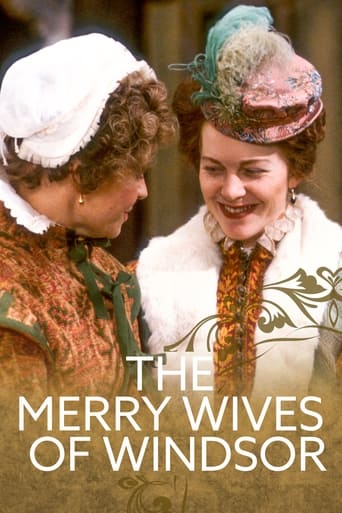Perry Kate
Very very predictable, including the post credit scene !!!
ReaderKenka
Let's be realistic.
Fulke
Great example of an old-fashioned, pure-at-heart escapist event movie that doesn't pretend to be anything that it's not and has boat loads of fun being its own ludicrous self.
Darin
One of the film's great tricks is that, for a time, you think it will go down a rabbit hole of unrealistic glorification.
TheLittleSongbird
I am not sure whether I'd go as far to say that this performance is a treasure, but I also don't think it is that bad either. It does have things that I think could have been done better, for example I do agree that the pacing was very slack at times and that as much as I like him Ben Kingsley was very neurotic and all over the place as Ford. The direction is inconsistent, the scenes with Mistress Page, with Mistress Ford and with Mistress Quickly are great and Falstaff also has some fine moments, but I found Ford's overdone and for some reason the denouncement doesn't quite come off. However, visually it is very sumptuous, with the sets and costumes lushly coloured and true to period. Shakespeare's dialogue still has sparkle and wit, and on the most part the performances are good with the women on a higher level of consistency than the men. Judy Davis is a dignified and humorous Mistress Ford, and Prunella Scales is the same as Mistress Page and even more so. Elizabeth Spriggs' Mistress Quickly is wonderfully conniving. Richard Griffiths acquits himself very well, witty and robust yet noble and vulnerable, while in support with the men while Tenniel Evans is likable it is Michael Bryant's very funny Dr Caius that stands out. In conclusion, a decent production that is well performed on the whole and sumptuous to look at, though the pacing and some of the staging could have been better. 7/10 Bethany Cox
tonstant viewer
David Hugh Jones directed one other play for this series, the protracted, dull betrayal of "Pericles: Prince of Tyre." One can only conclude he has no sense of pulse, for this performance too is endless. Comedies are like sharks. If they don't keep moving forward, they die.Some actors maintain their footing anyway. The women are good across the board. Judy Davis is a surprise as Mistress Ford - she's not the first actress that comes to mind when it comes to soufflés. Prunella Scales and Elisabeth Spriggs are particularly strong.Richard Griffiths keeps promising to break loose as Falstaff but never does. He's cut all the nonsense, but there's not enough left without it. You finally wonder if he's ambivalent about playing the part at all. Michael Bryant, murderously ice-cold as Ratchkovsky in "Fall of Eagles," is here brilliantly funny as Dr. Caius. Most of the rest of the male cast are good in their parts as well.A special exception must be made for Ben Kingsley. As Ford, he is weak, thin-voiced and neurotic, and when Ford masquerades as Brook, it's "Katy Bar the Door." The actor descends into an orgy of squeaks, gurgles, twitches and eye-rolling that give us a solid idea of what Jerry Lewis would have looked like in Elizabethan times. Or perhaps Dennis Weaver's baroque turn in Orson Welles's "Touch of Evil" done in iambic pentameter. A stronger director would have stepped hard on Mr. Kingsley's shenanigans and guided this misguided missile to a safer landing.A lovely set by Don Homfrey is a valentine to the lost art of TV studio design. There is ample opportunity here for the eye to roam happily over the scenery while waiting for something to happen with the actors.
Flash Sheridan
This production is not very good, but it's not quite as bad as I'd expected. Richard Griffiths holds up reasonably well in comparison to Anthony Quayle's portrayal in the BBC productions of Henry IV parts 1 & 2, though of course it's unfortunate that different actors portrayed the same characters in the different plays. Most of the other actors are reasonably competent, though not nearly as good as you'd expect from their work elsewhere. I agree that the direction is remarkably weak, with the denouement in particular being far too feeble to intimidate anyone, let alone Falstaff. But this was, after all, one of Shakespeare's weakest plays, allegedly written at royal command under severe deadline pressure.
brice-18
This delightful production, crammed with good things like a Christmas pudding, was originally presented at Christmas time - and what a treat! The sets evoke Shakespeare's Stratford, and the comedy is the nearest we'll get to how life was lived in the reign of Good Queen Bess. Richard Griffiths is perfect as Falstaff, rueful and gullible compared with his prime in 'Henry IV' but still thoroughly endearing. Prunella Scales and Judy Davis (then only 27) enchant as the merry wives and Ben Kingsley, though OTT, is very funny as the jealous Ford. Michael Bryant is a choice Dr Caius, Tenniel Evans a likeably Welsh Sir Hugh, and among a splendid supporting cast I must mention Alan Bennett as Justice Shallow - not least because I played the part myself in Paris once upon a time. Of course the word-play is challenging, and Falstaff's treatment is rather cruel, but the Bard ensures that at the end the fat knight is not totally discomfited, and the show ends with a glow!

